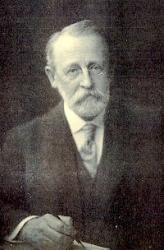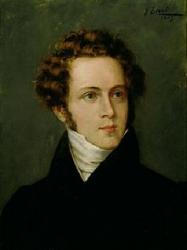Planning worship?
Check out our sister site, ZeteoSearch.org,
for 20+ additional resources related to your search.
- |
User Links
Person Results
William Wallace Gilchrist

1846 - 1916 Person Name: William W. Gilchrist Composer of "LIGHT OF THE WORLD" in The Evangelical Hymnal Born: January 8, 1846, Jersey City, New Jersey.
Died: December 20, 1916, Easton, Pennsylvania.
Buried: Saint Thomas’ Episcopal Church, Fort Washington, Pennsylvania.
Gilchrist’s family moved to Philadelphia, Pennsylvania, when William was nine years old. He attended school there until the outbreak of the American civil war, when his father’s business failed and William had to seek other work. Having a good voice, he sang in choirs and choruses, first as a soprano, and later a smooth, flexible baritone. He began singing some of the principal parts in the Handel and Haydn Society, where his first real musical life began.
At age 19, Gilchrist began studying organ and voice with Professor H. A. Clarke, gradually concentrating on theory. At age 25, he spent a year in Cincinnati, Ohio, as organist and teacher, returning to Philadelphia to take post of choir master at St. Clement’s Protestant Episcopal Church. He later became conductor of the Mendelssohn Club, Tuesday Club of Wilmington, and Philadelphia Symphony Society.
Gilchrist was best known as a composer. His first success was in 1878, winning two prizes from the Abt Society of Philadelphia for best choruses for male voices. In 1881, he won three similar prizes from the Mendelssohn Glee Club of New York. In 1884, he took a $1,000 prize from the Cincinnati Festival Association; the judges included Saint-Saëns, Reinecke, and Theodore Thomas. This work was an elaborate setting of the Forty-Sixth Psalm, and was enthusiastically received. Gilchrist afterwards modified it and brought it out at the Philadelphia Festival in 1885.
Gilchrist also served as editor of the 1895 Presbyterian hymnal, as musical editor of The Magnificat in 1910, and wrote symphonies, chamber and choral music. His works include:
An Easter Idyll
Psalm 46 (New York: 1882)
One Hundred and Third Psalm
Ninetieth Psalm
Fifth Psalm
Prayer and Praise
De Profundis
The Rose (New York: 1887)
Ode to the Sun
A Christmas Idyll (Boston, Massachusetts: 1898)
The Lamb of God (New York: 1909)
© The Cyber Hymnal™ (hymntime.com/tch)
William Wallace Gilchrist
Johann Friedrich Herzog
1647 - 1699 Person Name: J. G. Herzog Composer of "[Light of the world, we hail thee]" in Hymnal for the Sunday School Hertzog, Johann Friedrich, LL.D., son of Johann Hertzog, diaconus of the Church of the Holy Cross, in Dresden, was born at Dresden, June 6, 1647. After the completion of his legal studies at the University of Wittenberg, he was, from 1671 to 1674, tutor to the sons of General-Lieutenant von Arnim. In 1674 he returned to Dresden to practise as an advocate, where he died March 21, 1699 (Koch, iii. 361-63; Allgemeine Deutsche Biographie, xii. 251). The only hymn by him which has been translated into English is:—
Nun sich der Tag geendet hat, Und keine Sonn mehr scheint. [Evening.] Fischer, ii. 129, says that, according to the testimony of Hertzog's brother, this hymn was written one evening in 1670 while the author was still a student at Wittenberg. Stanza i. and the melody appear as No. 8 in the 1 Zehen of A. P. Krieger's News Arien. In 6 Zehen, Dresden, 1667 [Leipzig Town Library]. Hertzog seems to have adopted this stanza and added eight others, the form in 9 st. being found in Luppius's Andächtig Singender Christen-Mund, Wesel, 1692, p. 123, in 9 stanzas. Included as No. 622 in Freylinghausen's Geistreiches Gesang-Buch, 1704, with a 10th st., which, according to Fischer, first appeared in the Leipzig Gesang-Buch, 1693. Also in the Unverfälschter Liedersegen, 1851, No. 530. It speedily became popular, was often imitated, and still holds its place as one of the best German evening hymns. The translations in common use are:—
1. And now another day is gone. A good translation, omitting st. vii., by J. C. Jacobi in his Psalter Germanica, 1722, p. 1ll (ed. 1732, p. 174, altered). St. vii., "With cheerful heart I close my eyes," while parallel with the German is really stanza iv. of Watts's "And now another day is gone," in his Divine and Moral Songs. The 1732 text, slightly altered, is No. 479 in pt. i. of the Moravian Hymn Book, 1754, and stanzas i.-iii., vii., ix. altered are No. 391 in J. A. Latrobe's Collection, 1841. The form principally used is a cento beginning, "In mercy, Lord, remember me"; and being stanzas iii., vii., ix., x. slightly altered as No. 760 in the Moravian Hymn Book, 1789, and repeated, omitting st. x., in later editions (1886, No. 1183). This cento has recently been included in Windle's The Church Psalter & Hymn Book, 1862, in Dr. Thomas's Augustine Hymn Book, 1866, Dr. Martineau's Hymns of Praise & Prayer, 1873; and in America in the Methodist Episcopal Hymn Book, 1849; Hymns for the Church of Christ, Boston, 1853, &c.
2. And now another day is past. A version of stanzas i.-iv., vii.-ix., based on Jacobi, is found as No. 494 in the Appendix to the American German Reformed Psalms & Hymns, 1834, and also in the American Lutheran General Synod's Hymn Book, 1850.
3. The shades of night have banished day. A full and very good translation by Miss Dunn in her Hymns from the German, 1857, p. 16. Included, slightly altered and omitting stanzas vi., viii., in the Uppingham & Sherborne School Hymn Book, 1874, and thence in Thring's Collection, 1882.
4. Now that the sun doth shine no more. A good translation omitting stanzas iv., vi., x., by Miss Winkworth in her Chorale Book for England, 1863.
5. The day is done, the sun is set. A translation of stanzas i.-iii., vii., marked as by F. C. C, as No. 176 in Dr. Pagenstecher's Collection, 1864.
6. Since now the day hath readied its close. In full as No. 311 in the Ohio Lutheran Hymnnal, 1880, marked as a compilation.
Other translations are: (1) "The waning day hath reached its close," by H. J. Buckoll, 1842, p. 84. (2) "The day is gone, and now no more," by Dr. G. Walker, 1860, p. 61. (3) "Now that the day from earth hath crept," by Miss Manington, 1863, p. 136. [Rev. James Mearns, M.A.]
--John Julian, Dictionary of Hymnology (1907)
Johann Friedrich Herzog
Vincenzo Bellini

1801 - 1835 Person Name: V. Bellini Composer of "[Light of the world, we hail Thee]" in Select Songs No. 2 Vicenzo Bellini, a dramatic composer, born at Catania, Sicily; early went to Naples and became known a s a composer' his first opera was performed 1824; in 1828 "La Straniera" attracted the attention of all Italy, in 1833, he founded his fortune and his fame with "Norma," "La Sonnambula," and "Puritani;" died Sept 23, 1835, aged thirty three.
A dictionary of musical information: containing also a vocabulary of musical terms, and a list of modern musical works published in the United States from 1640 to 1875 by John Weeks Moore (Boston: Oliver Ditson, c. 1876)
Vincenzo Bellini
J. H. Leslie
Person Name: H. J. Leslie Composer of "ALPHA" in Songs of the Christian Life
J. H. Leslie
E. H. Johnson
1841 - 1906 Person Name: Elias H. Johnson Composer of "ELTON" in Songs of the Christian Life Johnson, Elias Henry, D.D., has been since 1882 Professor of Systematic Theology in Croser Baptist Theo. Seminary, Chester, Pa. He was born at Troy, N.Y., Oct. 15, 1841, and graduated at Rochester. After acting for two years as assistant paymaster in the U.S. Navy he was ordained to the Baptist Ministry, and served in several pastorates. He edited Songs of Praise for Sunday Schools, 1882; was assistant editor of the Baptist Hymnal, 1883; and also editor of Our Sunday School Songs, 1885, and Sursum Corda, 1898. He is also the author of several prose works. His hymn, "Father almighty, trembling I bow to Thee" (Holy Trinity), in Sursum Corda, 1898, No. 314, is dated 1867. [Rev. L. F. Benson, D.D.]
--John Julian, Dictionary of Hymnology, New Supplement (1907)
E. H. Johnson


 My Starred Hymns
My Starred Hymns

